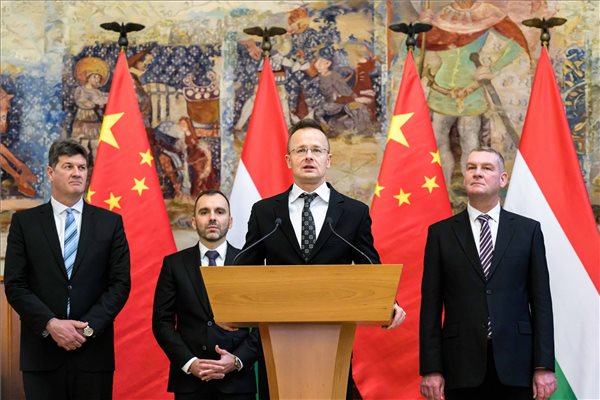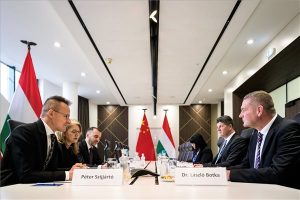
Last month, Prime Minister Viktor Orbán met BYD CEO Wang Chuanfu during a visit to the company.Continue reading

“China’s BYD, the world’s largest electric car manufacturer (by volume), is to build its first European factory in Szeged. This is one of the most significant investments in the history of the Hungarian economy, creating thousands of new jobs,” Minister of Foreign Affairs and Trade Péter Szijjártó announced.
The minister said that one in four companies selling electric cars globally is building new factories in the wake of their success on the world market, and that they have been looking for a location in Europe for a long time.
After 224 rounds of negotiations with the National Investment Agency,
the company’s board of directors finally decided to build its first production plant in Szeged,
which will be the sixth car manufacturing facility in Hungary, he said.

via MTI / KKM
BYD, which will have registered revenues of more than 20 billion forints (EUR 52.4M) by September this year and employ around 630,000 people, will manufacture electric cars in Hungary instead of batteries, and this project will be one of the biggest investments in the history of the Hungarian economy, creating thousands of new jobs, Szijjártó added.
He also pointed out that the government will provide financial support for the investment, but the amount will only be announced after the European Commission’s approval.
The company had revenue of USD 578.65B (EUR 525,24B) in the twelve months ending September 30, 2023, with 70.88% growth year-over-year. Revenue in the quarter ending September 30, 2023 was USD 162.15B (EUR 147B) with 38.49% year-over-year growth. In the year 2022, BYD Company had an annual revenue of $424.06B (EUR 385B) with 96.20% growth.
The yearly revenue of BYD is nearly three times more than Hungary’s annual GDP.
According to Szijjártó, this will further strengthen the position of the Hungarian economy and the foundations for long-term economic growth, while at the same time strengthening Hungary’s role in the global electric car transition.
“This investment also underlines Hungary’s leading role in the technological revolution. It has been a long time since Hungary has been at the forefront of such a fundamental global technological innovation, and now it is happening,” he pointed out, thanking his fellow MPs, the Szeged City Council, and his colleagues at the National Investment Agency for their cooperation.
During the last 224 rounds of negotiations, we have clearly demonstrated that there is one national economy and we all have a stake in the success of the national economy,”
he said.
The minister stressed that the world had gone through a series of crises in recent years, but there was one process that had been steady and stable despite all the uncertainties, and that was the electrification of the automotive industry, which was a backbone of the European and global economy.
He recalled that the three premium German car brands are already present in Hungary. Audi, BMW, and Mercedes have also placed a significant part of their electromobility strategy here.
The Szeged municipality said in a statement that the dynamically developing global company will build its electric car factory in Szeged, in the 300-hectare industrial park on the outskirts of the city next to the ELI-ALPS laser research institute and the Science Park, from where it will supply the European market. BYD, which will create thousands of new jobs, will implement the entire production process in Szeged, with the exception of battery production and chemical activities.
BYD, the world’s leading electric and plug-in hybrid car manufacturer, has chosen Szeged as its European manufacturing center because of its internationally renowned research background, scientific reputation, excellent infrastructure, favorable location, and green credentials.
Via MTI; Featured Image: MTI / KKM